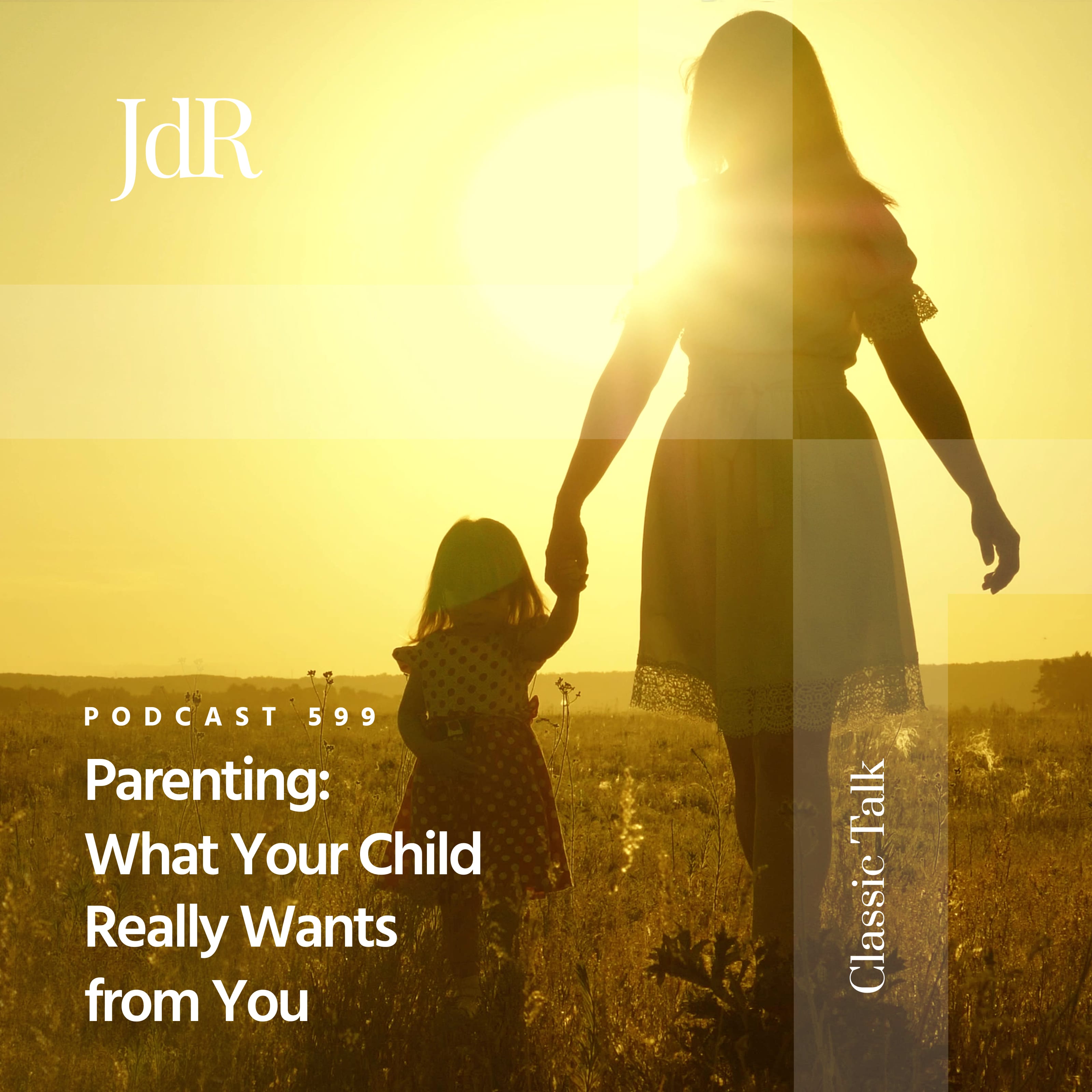615 – Seeing Without Judgment: Knowing Your Bond with Everyone
This conversation begins with the longing to find connection with a deceased parent, and reveals what stands in the way of living in the truth of your bond with everyone.

Q: When you talk about the consciousness that speaks from a new born baby’s eyes, we all know that, and as a mother of a new baby you can respond with an openness of heart and a softness. You can respond with love when it’s chaos and exhaustion. I now find myself parenting an older child who seems to be miserable with wanting, and when I respond to her with that openness and softness there seems to be a difficulty and her response seems to be very controlling of me. When I contract and tighten and respond to her in that way, the problem persists. What I really was hoping you could talk about is parenting a small child as consciously as possible in that openness you talk about.
John: Regardless of what she is being like, keep seeing her. Not seeing what she is doing, but seeing her. That touches what she knows. When she is being seen, then she is reminded of what she really is.
You are better off being a so-called bad parent but regularly seeing her than being a so- called good parent and not seeing her. Your child doesn’t value your good parenting. She only values being seen. Live enjoying seeing her and do what honestly seems best, knowing that what honestly seems best to you doesn’t ultimately matter at all.
Seeing her is ultimate, and remembering that any not-okayness in her will always grab a hold of everything that you have never gotten past your self, and her not-okayness will always be that, back to you. Her not-okayness will always want to grab a hold of those things that you are trying to avoid or hide. And it is not a little child that’s doing that.
It is a brilliant consciousness that sees.
Instead of being a parent, be what you honestly know … with her. As soon as you are being a parent, you won’t be able to see her. When you are being a parent, you are making your child all about you, and when your child is not being okay then she’ll rebel against what she knows is not real in you.
You can use your strength with a child, but only inasmuch as you can be in your weakness with a child. If you’re more in your strength than in your weakness with your child, then you have made being with your child, about you.
Q: And if you are more in your weakness, which I feel I am with her, is it still more about me?
John: If your weakness is in any way about self-defeat, or if your weakness is for you deflating, then it is all about you. But if being in your weakness with her is like sunshine, then that is not about you. That is about what you know is real. And if there is more of being in your weakness than using your strength, then very delicately use a little bit more strength. Then it’s sunshine that’s using strength.
When it is sunshine that uses strength, that makes your child smile within because they will then more easily really like what you are doing, even though it goes against what they want. When softness is being absolutely unbending, that makes a child smile because they know that you being unbendable has nothing to do with you, that it has nothing to do with you needing something, you holding on to something. That kind of unbendability is for them delightfully safe.
Let your no be no, without it in any way, being about you. Then that is a soft no that doesn’t bend, and in the unbendability there is no hardness. Such a space enables a young child to reason with you. That draws them out to talk instead of to act out. But if you are acting out, they won’t talk.
Softness that says no invites being talked to. Then a child begins to use its intellect instead of its feelings. A soft no invites the child to come out and to meet you because a soft no is meeting her. That soft no is able to see her. That provokes a child to use their minds in a playful way instead of just being stuck in something that they feel.
When they’re stuck in their feelings, they get frustrated. It is you being in your weakness, that gives them space to feel, and you in softness being in your strength that relieves them from being stuck in what they feel.
Q: Thank you so much.
615 – Seeing Without Judgment: Knowing Your Bond with Everyone
This conversation begins with the longing to find connection with a deceased parent, and reveals what stands in the way of living in the truth of your bond with everyone.
614 – Saving the Planet: The Change That Matters
John addresses a question on many people’s minds: what can we do about our degrading ecosystems, and what’s each person’s responsibility?
613 – The Beautiful Inevitability of a Self of Change
For this person, taking on the night shift with a sleepless baby and sensing the power in a simple hug became portals to some of life’s profound questions for John to answer.
612 – Staying in the Sunshine of Your Awakening
A spiritual awakening can feel like basking in sunshine, but what to do when the clouds roll in? John explains how to stay in your love once the experience has passed.
611 – Knowing the Difference Between You and Your Experience
John sorts out the growing sense this person has of being lost in her self and going crazy. Are any of her experiences real, and who is she, really?
610 – Your Door to the Great Beyond, Within
Feeling broadly content isn’t the same as knowing you’re vibrantly alive in this world. John unveils what’s missing and how to realize the richness of life, inside and out.

“My sole purpose is to be, in life, what we are after we’ve died. Through openness and softness of heart and core-splitting honesty at any personal cost, I live as that while actualizing the same in others I meet. I am available as a resource for anyone who recognizes and values this way of being.”
– John de Ruiter
| Cookie | Duration | Description |
|---|---|---|
| cookielawinfo-checkbox-advertisement | 1 year | Set by the GDPR Cookie Consent plugin, this cookie is used to record the user consent for the cookies in the "Advertisement" category . |
| cookielawinfo-checkbox-analytics | 11 months | This cookie is set by GDPR Cookie Consent plugin. The cookie is used to store the user consent for the cookies in the category "Analytics". |
| cookielawinfo-checkbox-functional | 11 months | The cookie is set by GDPR cookie consent to record the user consent for the cookies in the category "Functional". |
| cookielawinfo-checkbox-necessary | 11 months | This cookie is set by GDPR Cookie Consent plugin. The cookies is used to store the user consent for the cookies in the category "Necessary". |
| cookielawinfo-checkbox-others | 11 months | This cookie is set by GDPR Cookie Consent plugin. The cookie is used to store the user consent for the cookies in the category "Other. |
| cookielawinfo-checkbox-performance | 11 months | This cookie is set by GDPR Cookie Consent plugin. The cookie is used to store the user consent for the cookies in the category "Performance". |
| elementor | never | This cookie is used by the website's WordPress theme. It allows the website owner to implement or change the website's content in real-time. |
| PHPSESSID | session | This cookie is native to PHP applications. The cookie is used to store and identify a users' unique session ID for the purpose of managing user session on the website. The cookie is a session cookies and is deleted when all the browser windows are closed. |
| viewed_cookie_policy | 11 months | The cookie is set by the GDPR Cookie Consent plugin and is used to store whether or not user has consented to the use of cookies. It does not store any personal data. |
| Cookie | Duration | Description |
|---|---|---|
| locale | 1 month | This cookie is used to store the language preference of a user allowing the website to content relevant to the preferred language. |
| Cookie | Duration | Description |
|---|---|---|
| _ga | 2 years | The _ga cookie, installed by Google Analytics, calculates visitor, session and campaign data and also keeps track of site usage for the site's analytics report. The cookie stores information anonymously and assigns a randomly generated number to recognize unique visitors. |
| _gid | 1 day | Installed by Google Analytics, _gid cookie stores information on how visitors use a website, while also creating an analytics report of the website's performance. Some of the data that are collected include the number of visitors, their source, and the pages they visit anonymously. |
| CONSENT | 16 years 2 months 18 days 8 hours | YouTube sets this cookie via embedded youtube-videos and registers anonymous statistical data. |
| yt.innertube::requests | never | This cookie, set by YouTube, registers a unique ID to store data on what videos from YouTube the user has seen. |
| Cookie | Duration | Description |
|---|---|---|
| IDE | 1 year 24 days | Google DoubleClick IDE cookies are used to store information about how the user uses the website to present them with relevant ads and according to the user profile. |
| NID | 6 months | NID cookie, set by Google, is used for advertising purposes; to limit the number of times the user sees an ad, to mute unwanted ads, and to measure the effectiveness of ads. |
| test_cookie | 15 minutes | The test_cookie is set by doubleclick.net and is used to determine if the user's browser supports cookies. |
| VISITOR_INFO1_LIVE | 5 months 27 days | A cookie set by YouTube to measure bandwidth that determines whether the user gets the new or old player interface. |
| YSC | session | YSC cookie is set by Youtube and is used to track the views of embedded videos on Youtube pages. |
| yt-remote-connected-devices | never | YouTube sets this cookie to store the video preferences of the user using embedded YouTube video. |
| yt-remote-device-id | never | YouTube sets this cookie to store the video preferences of the user using embedded YouTube video. |
| yt.innertube::nextId | never | This cookie, set by YouTube, registers a unique ID to store data on what videos from YouTube the user has seen. |